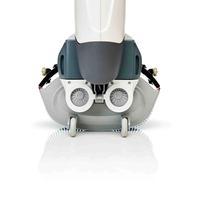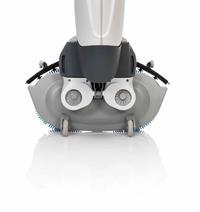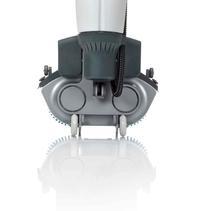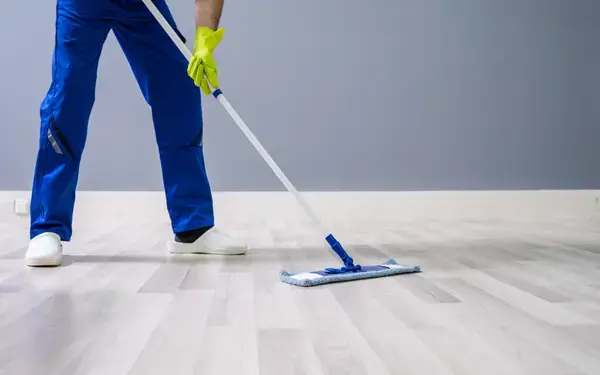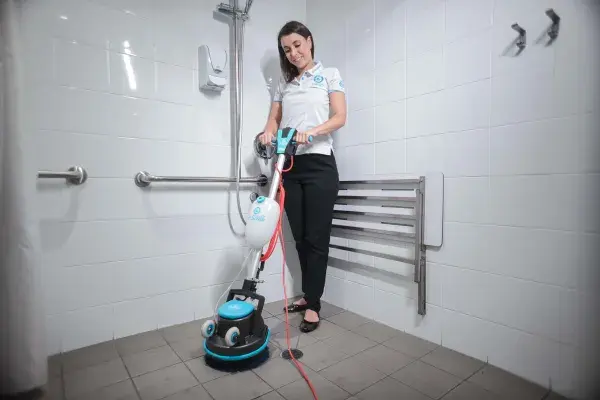You are reading: What's The Best Battery For Floor Scrubbers?
03 September 2022
4min read time
Brooke Payne
What's The Best Battery For Floor Scrubbers?
Share:
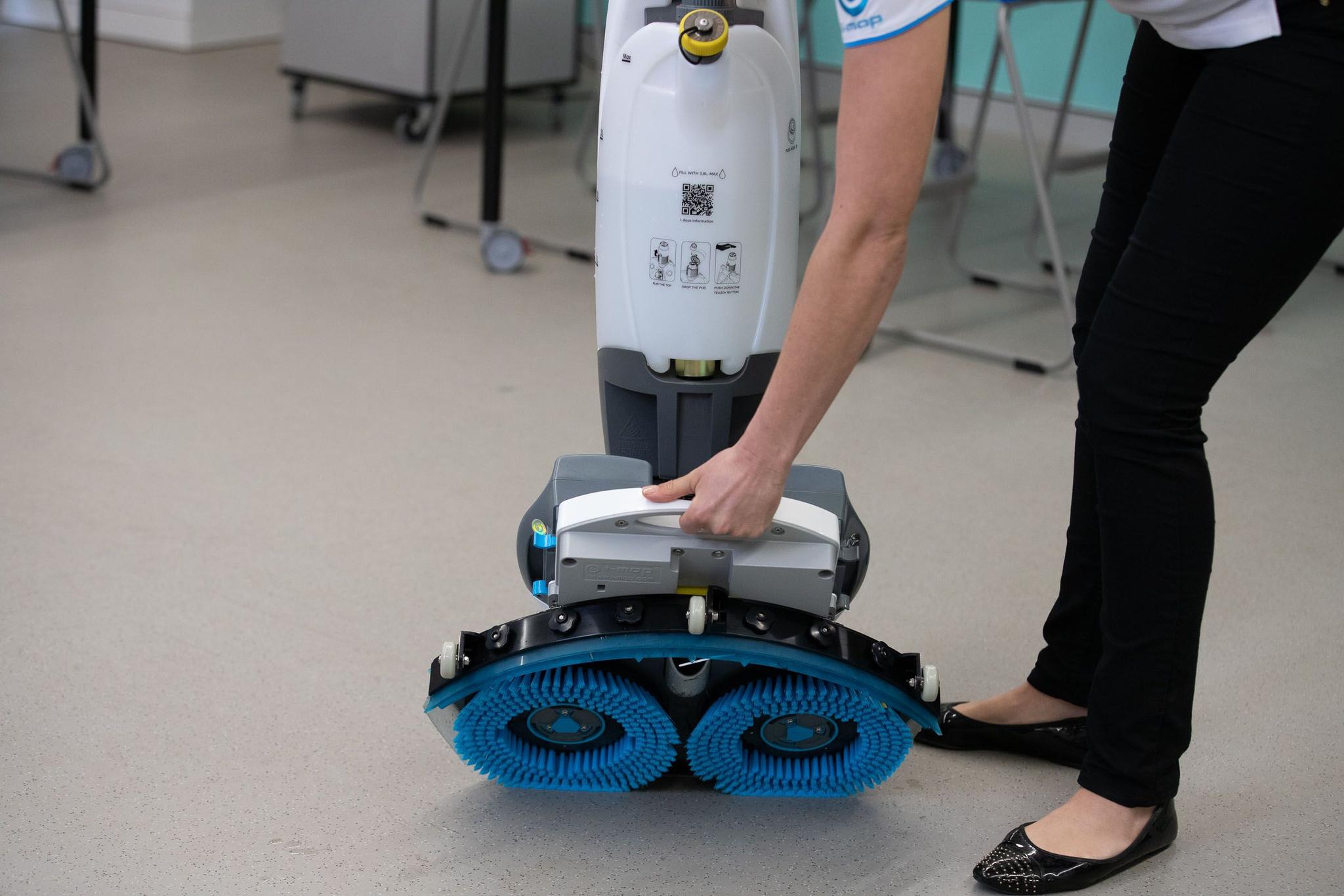
Key Insights
- There are different types of batteries that different floor scrubbers operate from.
- This includes lead acid, AGM and Lithium-ion
- Battery technology is an important consideration when choosing a floor scrubber
Cordless floor scrubbers are highly popular, and for good reason – in commercial settings, they can save you a significant amount of time and money. But the type of battery you choose – or have to use – for your floor scrubber has a substantial impact on your time, productivity, running costs and more.
While lead acid batteries are the least expensive, they can have drawbacks. Gel batteries are a step up, but Lithium-ion batteries are unquestionably the best option. Here's how to choose the right one for you.
There are three common battery types used in floor scrubbers:
1. Lead acid or wet cell batteries – these are the least expensive type of battery for floor scrubbers but come with significant drawbacks. Lead acid batteries are bulky, heavy, and normally require regular maintenance of the cells to prevent damage to the batteries. They also retain a ‘memory’ caused by partially discharging the battery before they are recharged. This memory prevents the battery from recharging fully, which can drastically shorten its operating life and the run-time of your floor scrubber.
2. Gel or AGM batteries – these are considered superior to lead batteries for use in floor scrubbers as they are leak-proof, spill-free, and maintenance-free. They are also heavy and bulky however, which increases the weight of your floor scrubber and makes them harder to manoeuvre.
3. Lithium-ion (Li-ion) batteries – These are the ultimate battery for commercial floor scrubbers. They are lightweight, highly efficient, energy-dense, and are better for the environment, but that’s not all:
They are spill and maintenance-free and don’t need to be kept horizontal.
They have a far higher power-to-weight ratio, meaning the battery can be lighter while giving equivalent power output to its counterparts.
They are memory-free, which means that if you discharge a small percentage of the battery, you can recharge it without impacting the overall life of your battery.
They are fast-charging, so there is less downtime and more getting things done!

Let's take a closer look at the benefits of lithium batteries
1. BATTERY CAPACITY (Gives you more charge, less weight)
In short, battery capacity refers to how much charge is in the battery (how long the current that is drawn from the battery can continue while the battery can supply a load). Let’s compare the capacity and size of lead acid, nickel metal hydride and Li-ion batteries:
If all three are the same CAPACITY (producing the same charge):
The weight of Lead - NiMH - Li-ion will be around 6:3:1
(Meaning: Li-ion is considerably lighter)
If all three are the same SIZE:
The capacity of Lead - NiMH - Li-ion, will be around 1:2:4 respectively
(Meaning: Li-ion can produce far more charge)
In summary: Lithium is far lighter and produces more charge than its counterparts.
Example: Say you had two machines that had the same size battery pack. If you use a Li-ion battery pack, you’ll get eight hours of running time and the device will be lighter. With a lead acid battery pack you’ll only have two hours of running time and the machine will be much heavier.
2. EFFICIENCY
Lithium batteries are more efficient than other battery types. For example, most lead batteries are only 80-85% efficient, depending on the condition and model. Alternatively, lithium batteries are more than 95% efficient. This means you’ll keep your batteries for longer.
3. CYCLE LIFE
Battery cycle life is the amount of time you can charge and discharge your battery before it gives up and needs to be replaced.
- Lead acid battery: approximately 300 to 400 cycles
- Lithium-ion battery: approximately 500 to 600 cycles (With the improved technology of the i-team i-power Li-ion batteries however, you still have 50% capacity after 1400 cycles)
4. ENERGY DENSITY
Lithium batteries can fit much more energy into less space than lead batteries. Consequently, they take up less space in your device, allowing for lighter, better design and improved manoeuvrability, as is the case with the i-scrub.
5. FAST CHARGING
Most large commercial floor scrubbers require a minimum of 6 to 8 hours of charge time before they are up and running. Lithium batteries can handle a higher amperage from the charger, allowing them to charge faster. For example the advanced technology of the i-team supercharger enables an i-power 9 i-mop battery to be fully charged in just 1 hour. Lead acid batteries by comparison slow down significantly at around the 85% capacity mark. After that, the charger automatically slows down to top off the batteries.
6. ENVIRONMENTALLY FRIENDLY
Lead acid batteries are terrible for the environment. They contain sulphuric acid and lead, both of which are toxic to the environment and the human body.
Read: 15 Compelling reasons to upgrade to the i-mop floor scrubber.
7. SAFETY
In theory, NiMh (Nickel metal hydride) batteries are the safest on the market. Lithium batteries are actually more dangerous than lead because of their chemical materials. However, due to the construction of our i-power lithium battery cells, coupled with the intelligent Battery Management System (BMS), lithium batteries can be as safe or even safer than their counterparts.
8. COST
Lead batteries are cheaper per unit. When looking at the cost of running the battery each hour, lithium batteries are about a third of the price.
Read more on streamlining commercial cleaning at Amiliston Cleaning Services with i-mop.

Weighing it all up
Battery technology is a crucial factor when selecting a floor scrubber, especially for businesses in Australia and New Zealand where uptime is essential. Choosing the right battery can help you avoid downtime, clumsy machinery, and unnecessary running costs, but it’s not the only thing to consider.
When deciding on a floor scrubber, you’ll also need to factor in size, manoeuvrability, portability, ease of use, and storage. It's essential to consider the environmental impact too, especially as sustainability becomes a growing concern across Australia and New Zealand.
Take the time to do your research. An informed decision will ensure you select the best floor scrubber for your specific cleaning needs, reducing long-term costs and improving efficiency.
Once you know which battery fits your workflow, browse our range of commercial and industrial floor scrubbers to compare models and request a tailored quote for your facility.
Other Common Questions Answered
1. What type of battery is best for floor scrubbers?
Answer: Lithium-ion batteries are generally the best choice for floor scrubbers. They offer high energy density, longer run times, and quicker charging compared to traditional lead-acid batteries. Additionally, lithium-ion batteries have a longer lifespan and require less maintenance, making them more cost-effective in the long run.
2. How does battery capacity affect floor scrubber performance?
Answer: Battery capacity, measured in amp-hours (Ah), directly affects the run time of a floor scrubber. A higher capacity battery allows the machine to operate longer between charges, which is crucial for extended cleaning sessions. For optimal performance, choose a battery with sufficient capacity to meet your cleaning needs without frequent recharging.
3. What should I consider when maintaining floor scrubber batteries?
Answer: Proper maintenance is essential to extend the life of floor scrubber batteries. Ensure that batteries are kept clean and free from corrosion. Regularly check the battery’s charge level and avoid deep discharges. Follow the manufacturer's guidelines for charging and storage, and perform routine inspections to detect and address any issues early.
References
- CleanLink – Choosing the Right Battery for Your Floor Scrubber
- American Battery Solutions – Floor Scrubber Battery Guide
- Facility Cleaning Decisions – The Evolution of Floor Scrubber Batteries
Products Featured Inside this Article
Media and Insights
Join the movement that's changing what clean means.
Be part of a cleaner world. Get a live demo at a time that suits you.
Book a Demo